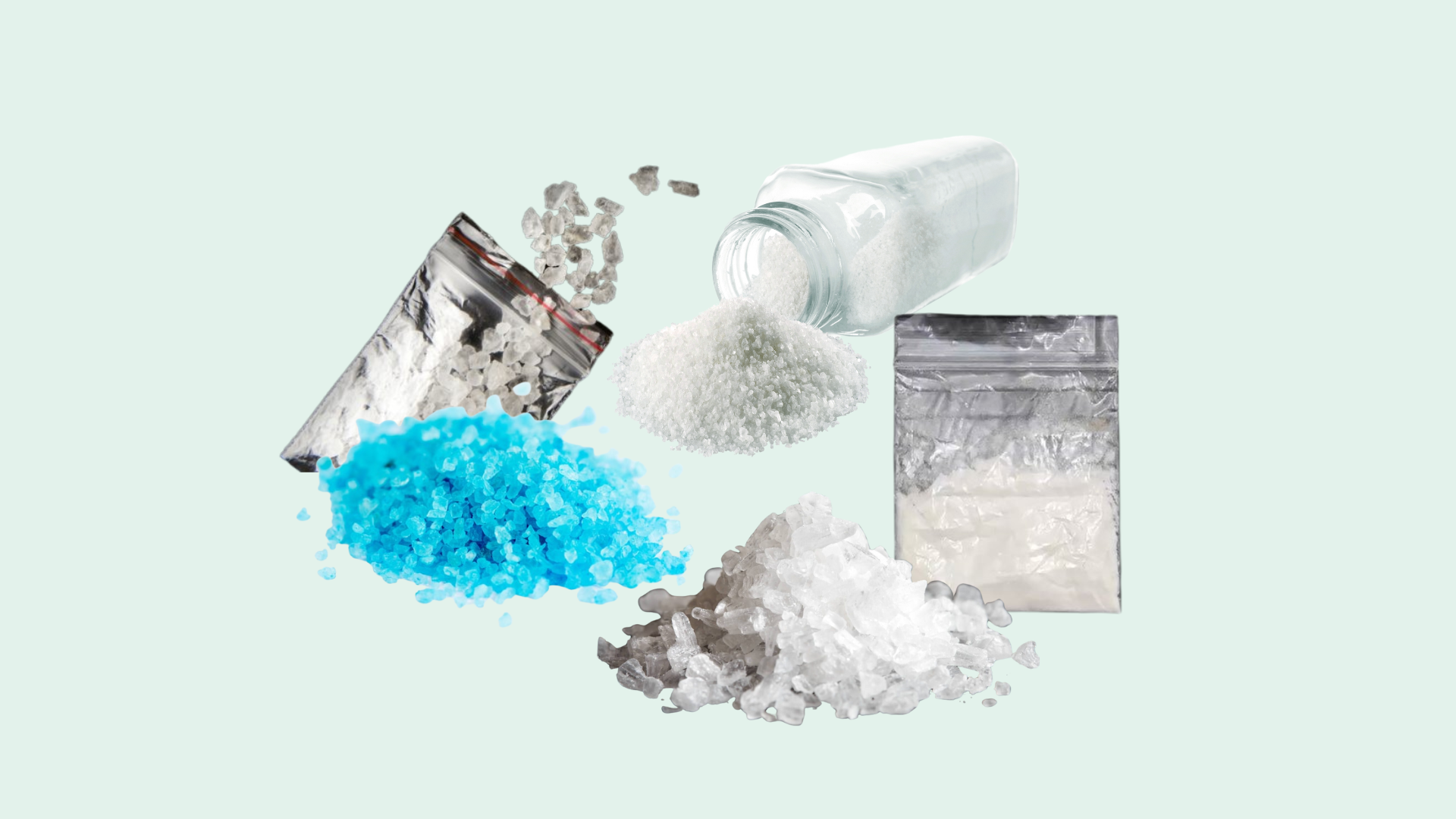What Are Bath Salts?
Bath salts are a group of synthetic drugs that mimic the effects of traditional stimulants. They are typically sold as a white or brown crystalline powder, often marketed under innocuous-sounding names like “plant food,” “jewelry cleaner,” or “phone screen cleaner” to avoid detection. The active ingredients in bath salts are synthetic cathinones, chemically related to the natural stimulant in the khat plant. Common synthetic cathinones in bath salts include MDPV, mephedrone, and methylone.
What Are the Side Effects of Bath Salts?
The use of bath salts can lead to a wide range of physical and psychological side effects, many of which can be severe and even life-threatening.
Desired effects may include
- Euphoria
- Increased energy
- Sociability
- Reduced inhibitions
However, high doses or repeated use can also cause
- Rapid heart rate
- Hypertension
- Paranoia
- Hallucinations
- Agitation
- Aggressive behavior
In extreme cases, bath salts use has been linked to excited delirium, a state of extreme agitation that can result in self-harm or violence towards others.
What Is Bath Salts Addiction Treatment?
Given the unpredictable and dangerous nature of bath salts, effective addiction treatment is crucial for those struggling with this substance use disorder. While there are currently no FDA-approved medications specifically for the treatment of bath salts addiction, a combination of behavioral therapies and other supportive interventions have shown promise in helping individuals overcome their dependencies.
Behavioral Therapies
The mainstay of bath salts addiction treatment is behavioral therapy, which aims to address the underlying psychological and behavioral factors that contribute to substance abuse. Common therapeutic approaches include
Cognitive Behavioral Therapy (CBT) – CBT helps individuals identify and modify the thought patterns and behaviors that lead to drug use, teaching them coping strategies to manage cravings and prevent relapse.
Contingency Management – This approach uses a system of rewards and incentives to reinforce positive behaviors, such as abstinence from drug use or participation in treatment.
Motivational Enhancement Therapy – This client-centered therapy helps individuals resolve ambivalence about changing their substance use behaviors and increase their motivation to seek and engage in treatment.
Withdrawal Management
While bath salts withdrawal is typically not life-threatening, it can be highly uncomfortable and may include symptoms such as depression, anxiety, insomnia, and intense cravings. Patients may benefit from medical monitoring and supportive care during the detoxification process to help manage these withdrawal effects.
A Comprehensive Treatment Approach
Effective bath salts addiction treatment often involves a multifaceted approach that combines behavioral therapies, withdrawal management, and other supportive services. This may include individual counseling, group therapy, family therapy, medication management (for co-occurring mental health conditions), and participation in peer support groups like Narcotics Anonymous (NA).
What to Expect During Bath Salts Addiction Treatment
The specific treatment plan for an individual with a bath salts addiction will depend on the severity of their substance use, any co-occurring mental health conditions, and their unique needs and goals. However, the general process of bath salts addiction treatment typically involves the following steps:
- Assessment and evaluation: Patients will undergo a comprehensive assessment to determine the extent of their substance use, any underlying mental health issues, and the appropriate level of care required.
- Detoxification: If necessary, patients experience a medically supervised detoxification process to safely manage withdrawal symptoms and stabilize their condition.
- Behavioral therapy: Patients will engage in individual and/or group therapy sessions, focusing on developing coping strategies, addressing underlying issues, and building a foundation for long-term recovery.
- Medication management: For those with co-occurring mental health disorders, such as depression or anxiety, medication management may be incorporated into the treatment plan.
- Aftercare planning: Near the completion of primary treatment, patients will work with their care team to develop an aftercare plan, which may include ongoing therapy, participation in support groups, and connection to community resources.
Life After Treatment: Maintaining Recovery
Recovering from a bath salts addiction is a lifelong process, and maintaining sobriety requires ongoing effort and commitment. After completing a formal treatment program, individuals should continue to engage in aftercare activities and support services to help prevent relapse and sustain their progress.
This may include:
- Regularly attending support group meetings, such as NA
- Continuing individual or group therapy sessions
- Participating in sober living arrangements or community-based recovery programs
- Developing a solid support network of family, friends, and peers who are committed to a substance-free lifestyle
- Practicing healthy coping mechanisms, such as exercise, mindfulness, and stress management techniques
- Regularly checking in with a mental health professional or addiction treatment provider
By staying actively engaged in their recovery journey and implementing effective relapse prevention strategies, individuals with a history of bath salts addiction can successfully maintain their sobriety and reclaim their lives.

